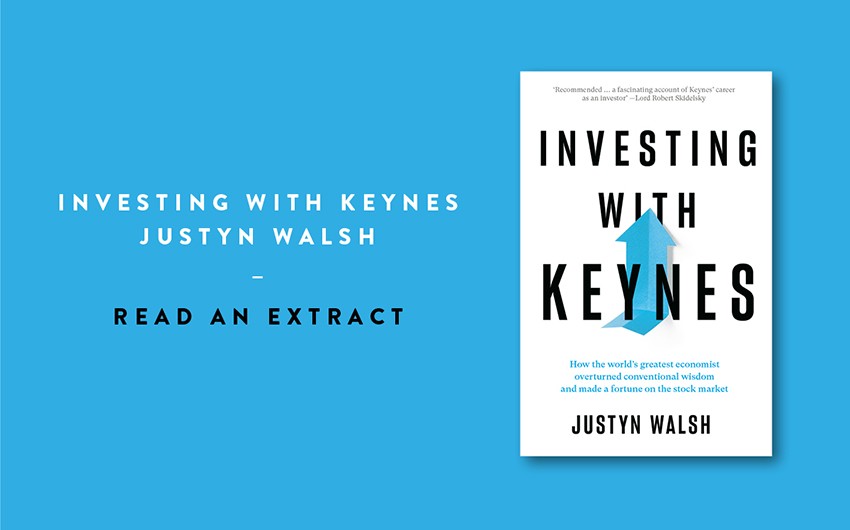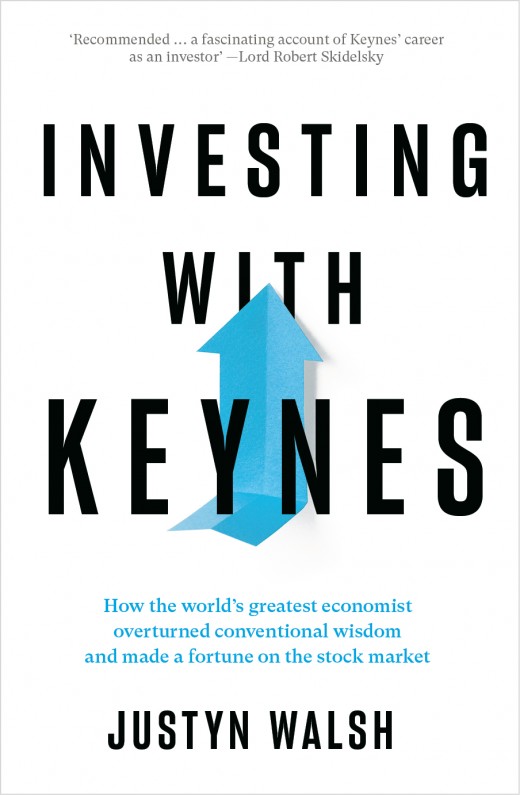News

News >
Read an extract: Investing with Keynes
In today’s era of profound uncertainty and volatility, the insights of Keynes are more relevant than ever. Read the introduction to Investing with Keynes.
John Maynard Keynes conferred a distinct glamor on the dismal science of economics. He was a Cambridge don, key member of the Bloomsbury set, bestselling author, husband of a world-famous ballerina, father of modern macroeconomics, valued government adviser, ennobled member of the House of Lords, and midwife to the IMF and the World Bank. His bracing response to the doldrums of the Great Depression – ‘The patient needs exercise, not rest’ – heralded the Keynesian era of managed capitalism and pump-primed Western economies. Renowned almost as much for the variability of his opinions as for the vigor, style, and intelligence with which they were advanced, Keynes delighted in assaulting conventional wisdom and deployed pungent prose as his weapon of choice.
Despite affecting an aristocratic disdain for the profession of money-making, Keynes was also an incredibly successful stock market investor. At the time of his death, his net worth – largely accrued through his investment activities and supplemented by judicious art purchases – amounted to the present-day equivalent of $30 million. The Cambridge college fund administered by Keynes recorded a twelve-fold increase in its value while under his stewardship, a period during which the broader market averages failed even to double. In his role as chairman of one of Britain’s most venerable life assurance companies his speeches were, according to a journalist at the time, ‘so highly regarded by the City that his prediction of a trend was enough to jiggle the stock market.’ Keynes was that rarest of beasts – an economist who, having clambered down from his ivory tower, mastered the financial markets in practice as well as in theory.
Notwithstanding his financial success, one might reasonably query how an analysis of Keynes’ stock market techniques can profit the modern investor. Keynes was, after all, a child of the Victorian era and died three-quarters of a century ago. He lived in a different, more decorous time than our own – Keynes could have been describing himself when he conjured the image of ‘the inhabitant of London … sipping his morning tea in bed,’ languidly contemplating whether to ‘adventure his wealth in the … new enterprises of any quarter of the world.’ He invested in whaling companies and other now-defunct industries, and was directed by editors to ensure that his magazine articles were of sufficient length to allow readers to work through at least three glasses of port. Redolent as he is of another age, is there anything to be gained from an appraisal of Keynes’ investment principles in this era of day traders, delta ratios, and dot-coms?
The answer, perhaps surprisingly, is a resounding ‘yes’. After a couple of false starts, Keynes alighted on a set of precepts that won him singular stock market success. In the twilight of his long investment career, he declared with characteristic immodesty that:
the financial concerns where I have had my own way have been uniformly prosperous … My difficulties in financial quarters all through have been the difficulty of getting unorthodox advice accepted by others concerned.
These unorthodox tenets anticipated, to a remarkable degree, the investment philosophies of some conspicuously successful contemporary ‘value investors,’ most notably Warren Buffett of Berkshire Hathaway. Noting that Keynes’ ‘brilliance as a practicing investor matched his brilliance in thought,’ Buffett has on a number of occasions recognized his intellectual allegiance to the English economist. Just as importantly to the modern reader, Keynes’ observations were set out in the limpid, casually elegant language for which he was rightly acclaimed. As his friend, the newspaper baron Lord Beaverbrook, noted, Keynes made ‘exciting literature out of finance’ – truly a colossal feat.
Keynes wrote in his best-known work The General Theory of Employment, Interest and Money that:
practical men, who believe themselves to be quite exempt from any intellectual influences, are usually the slaves of some defunct economist. Madmen in authority, who hear voices in the air, are distilling their frenzy from some academic scribbler of a few years back.
Following the Global Financial Crisis of 2008 and more recently the worldwide disruption wreaked by the COVID-19 pandemic, Keynes’ academic scribblings have once again become the dominant creed for Western nations scrambling to kickstart moribund economies. Paralleling this Keynesian renaissance are advances in the field of behavioral finance validating the economist’s observations on investor psychology and stock market dynamics, while recent empirical studies affirm Keynes’ reputation as an expert stock picker and star fund manager. The insights of John Maynard Keynes – a man who lived and prospered through two world wars, the Crash of 1929, and the Great Depression – are more relevant than ever in our era of profound uncertainty and volatility.
Keynes’ upbringing and personal philosophy deeply influenced his attitude toward money and its pursuit. Any investigation of the man’s investment principles must, therefore, also chart some of the key landmarks of his life. One of Keynes’ closest friends, the iconoclastic Lytton Strachey, remarked that his professional task as a biographer was to:
row out over that great ocean of material, and lower down into it, here and there, a little bucket, which will bring up to the light of day some characteristic specimen, from those far depths, to be examined with a careful curiosity.
Our inquiry is necessarily very focused – we will be hauling to the surface those ‘characteristic specimens’ relating chiefly to Keynes’ investment precepts. Nevertheless, in carrying out these soundings, hopefully at least a flavor of Keynes’ ample life will also be conveyed to the reader. To extend Strachey’s metaphor, occasionally we will have cause to divert our gaze beyond the objects of our immediate scrutiny and toward the expansive, sometimes turbulent ocean that constituted the life of John Maynard Keynes.
Investing with Keynes is in bookstores now.
Share this post
About the author
Justyn Walsh is a former investment banker and corporate lawyer, and has worked across Europe, Asia, the Middle East and Australia. He is the CEO of an asset management firm and a company director.
More about Justyn Walsh




